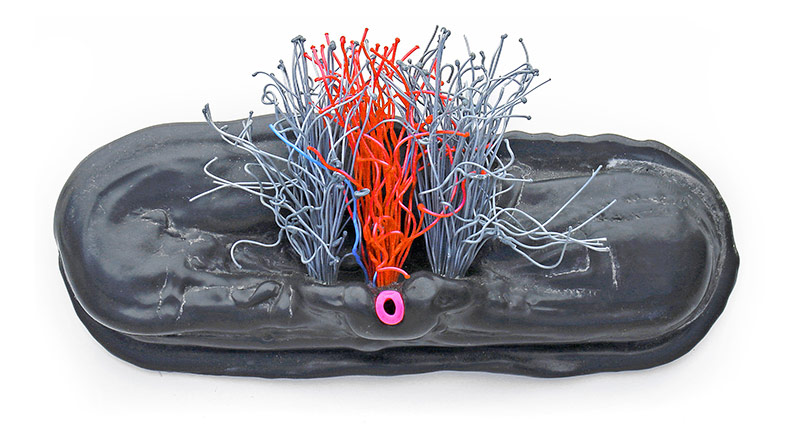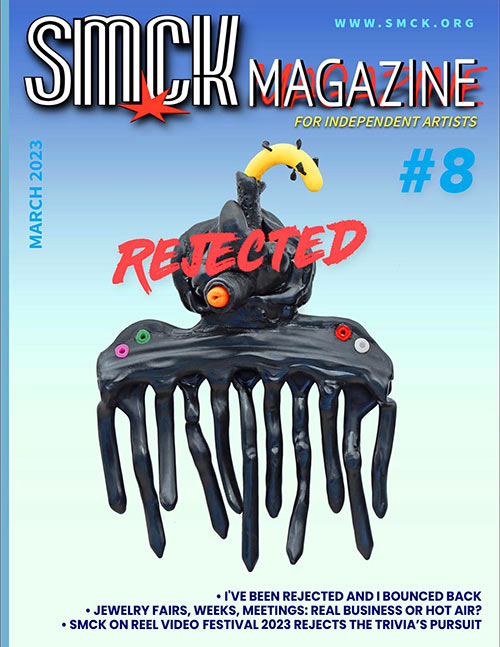REJECTED
BY DESIGN
MANY ARTISTS' APPLICATIONS LOOK LIKE MESSAGES IN A BOTTLE TOSSED INTO THE OCEAN.
By Loukia Richards
 "Ugly Brooch" by Christoph Ziegler. Photo: C.Z.
"Ugly Brooch" by Christoph Ziegler. Photo: C.Z.
Before you apply for a grant, other funding, participation in a show, or a residency make sure that you really want your application to be successful. Most artists closely examine their portfolio to see if it meets the criteria, but few pay the same attention to how hard they are willing to work on increasing their chances of success.
SMCK Magazine compiled this insider's guide to why many artists' applications look like messages in a bottle tossed into the ocean – plus additional tips on how not to waste your energy and time applying for grants or award that you will not be awarded.
1. Is there an age limit – either stated or implied? Are you applying for a grant or residency that addresses, for example, established artists while you are still mid-career and you still have a lot of work ahead to reach stylistic maturity?
2. How prestigious is the grant or prize to which you are applying and who are the jurors? It is almost impossible for a juror to thoroughly review the applications of hundreds or thousands of artists applying for a prize or grant in the short period (sometimes just a few days) at their disposal to make a decision. Having a mentor to support the application makes jurors feel secure about their choice as they need to back their decision with arguments.
3. Local politics also play a role in the selection. Institutions, conservative by definition, often support artists who are locals and have already interacted with them and the local community rather than 'newcomers' or 'outsiders'. Include and highlight those connections in your application.
4. The more complex the application procedure, the less competition an artist faces for the specific grant or award other than their own performance. Specific requirements such as letters of recommendation from industry VIPs, press reviews, or other documentation of an artist's achievements discourage artists who submit the same standard portfolio to hundreds of juries.
Application procedures that are connected to a lot of original work or involve hard tests or personal interviews by a committee are usually submitted by artists determined to receive the grant or award.
5. Submitting a generic application to multiple galleries or institutions is the biggest mistake an artist can make. Not only will they not be awarded the grant or prize, but they will also become known as an artist who does not go the extra mile to achieve their goal.
 Studio view: raw material. Photo: C.Z.
Studio view: raw material. Photo: C.Z.
6. Applications must answer one question that is implied even when not directly asked: why does your project merit funding or the award? Most artists think the answer is because their work is ‘innovative’ or ‘great’ or ‘unique’, i.e., because I deserve it.
However, institutional grants or prizes are not meant to promote an individual artist’s work, but to benefit as many people as possible, even by awarding the prize to an artist who can then inspire other people to dream big or improve their life conditions. Changing the focus from yourself to the community, from what you get to what you give, opens your mind to new perspectives and opportunities.
7. To increase your chances of success, always research the institution to which you are applying. This procedure will help you clarify who are you addressing and be more specific about what you have to offer to this prospective partner.
8. Art grants lotteries are fashionable nowadays and considered ‘fairer’ as everyone has the same chance of winning. Regardless, long-term success always comes by design and never by chance – even if you win the lottery once.
9. The more avant-garde your work, the more innovative, the fewer the chances that you will receive a grant or support from a mainstream institution. Jurors need to justify their decisions. Innovative or avant-garde is often difficult to describe and because it is not mainstream yet, its value is not yet recognized by everyone. Grants for emerging artists are often given to artists whose work can be compared to a popular or established star.
10. Academia or established cultural institutions apply conservative criteria, while corporate or NGO or media partners might be interested in funding your project if your message reflects their philosophy.
11. To adapt to the requirements of various institutions, many artists change the concept of their work, thus destroying their own project. The new concept is then fake or artificial and lacks stamina and conviction. Artists should persist in finding the means and support they need to realize their vision instead of constantly adapting their work to what juries or committees want to see.
12. When an art project is unusual or original, crowdfunding and micro-sponsoring can yield better results than applying for a grant.
Homepage: www.loukiarichards.net
Instagram: @loukiarichards
08_smck-on-reel_2023






